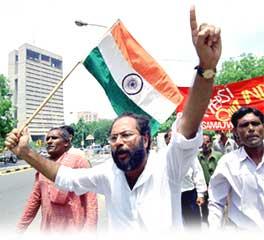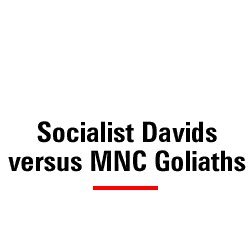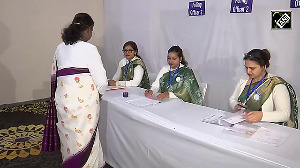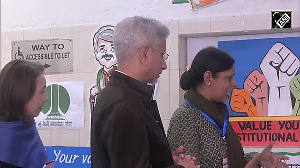

Every single day at 12.30 pm, come rain or shine, about a dozen activists of a little known organisation called the Samajwadi Abhiyaan (Socialist Movement) march from Jantar Mantar to the Parliament Street police station in New Delhi, court arrest, and disperse.
No one looks at them. No one cares to ask about them. And no one seems to agree with them.
This small band of dedicated fighters wants to drive the Coca-Cola Company and PepsiCo out of India. Their campaign entered its 3,495th day on September 18, 2003.
Their agitation is called, quite obviously, the 'Coke and Pepsi Quit India movement.'
You may dismiss this group as a bunch of jokers. But that does not faze George Fernandes, convener of the ruling National Democratic Alliance, Union defence minister, and president of the Samajwadi Abhiyaan, or his deputy Aneel Hegde, who has been leading the daily street marches since March 1, 1994.
Hegde, a bachelor jholawala, lives with Fernandes in his official residence at 3, Krishna Menon Marg. A small red hoarding against Coke and Pepsi is kept at the residence.
Grassroot-level workers, from among the poorest of the poor in Bihar, kabaadiwalas from Delhi, leaders of the teachers union in Dhanbad, leaders fighting for miners in Bihar and Jharkhand, and scores of small organisations from Karnataka, Orissa and Delhi participate in Hegde's daily march whenever they can.
Binay Kumar Singh is a leader of the Koyla Khadan Shikshak Sangh. "We want people to drink lassi, not Pepsi or Coke," he says.
Radha Mohan Biswas has come from West Bengal. "In Indian villages people drink Coke and Pepsi to show off that they have become 'advanced.' How wrong it is to drink these colas, they don't understand," he says. "We want people to drink fruit juices."
Hegde claims that those who participate in his symbolic protest never drink Coke and Pepsi.
For Fernandes, 73, to be part of such a movement is nothing new. As president of the All-India Railwaymen's Federation in 1974, he led India's largest railway strike, which was crushed by then Prime Minister Indira Gandhi. He is a supporter of the causes of Burmese, Tibetan and Sri Lankan Tamil rebels. In 1977, as Union industry minister, he caused a sensation by kicking Coca-Cola out for violating Indian investment laws.
Fernandes had claimed that Coke, which had come to India with an initial investment of $20,000, had taken $8 million in profits out of the country by 1977.
Though Fernandes has since made innumerable compromises in his political career and lost the sheen he once had as a union leader, Coke and Pepsi remain on top of his adversaries' list.
The Samajwadi Abhiyaan had nothing to do with the recent controversy over the quality of Coke and Pepsi kicked off by a study conducted by the Centre for Science and Environment, but Hegde is more than happy. "You may laugh at us, but we are serious," he says. "Opposing the economic policies of the government does not give votes, therefore we are alone in the streets. Leftists too are against multinationals, but they have forgotten the value of street protest. Lack of support to our movement does not mean our cause is not just."
There is a tale behind Fernandes' anti-Coke/Pepsi stance going back to the days when he was a minister in the first non-Congress government at the Centre in 1977. It was summer and he was visiting a village in his constituency in Bihar. The thirsty minister asked for a glass of water. But the district magistrate stopped him, saying, "Sir, this is not for you, you can't drink this water. We have Coca-Cola for you."
It infuriated Fernandes that after 30 years of planning, Coca-Cola had reached the villages, but not potable water.
Later, when he was moved to the industry ministry, he applied the Foreign Exchange Regulation Act, which limited foreign investment in domestic firms to 40 per cent of the equity, strictly. Coca-Cola officials were summoned and asked to transfer technology to their Indian partners or pack up. They packed up.
Later, in an interview to Multinational Monitor (a monthly magazine based in Washington, DC, and tracking corporate activity, particularly in developing countries, focusing on the export of hazardous substances, worker health and safety, labour union issues and the environment), Fernandes recalled, 'Dealing with Coke at that time was quite an experience about how multinationals can fight back. First, how they can bribe people at the highest levels of government. Second, how they can use the media and manipulate the media. Third, how they can rough you up.'
In 1989, the Coca-Cola Company re-entered the Indian market. At the time Fernandes was a Cabinet minister in the minority government led by Vishwanath Pratap Singh. But his protests fell on deaf ears.
By 1994, Coca-Cola and PepsiCo, which had entered India a couple of years before Coke, had taken over the entire Indian market and their total turnover had reached Rs 1,800 crore [about $393 million at the current exchange rate].
Clearly, the multinationals had emerged the winners.
In 1992, Fernandes called a meeting of Gandhians, Naxalites and Socialists in Wardha, Maharashtra, and helped form the Azadi Bachao Andolan to fight the entry of multinational corporations.
In March 1993, as president of the Hind Mazdoor Kisan Panchayat, one of India's biggest trade unions with a membership of more than one million, Fernandes led an agitation against the multinational Cargill, which had been given the right to produce salt in Gujarat with advanced technology. It was feared that eventually 250,000 workers would lose their jobs to mechanization. Cargill eventually beat a retreat.
Flushed with the success in Gujarat, Fernandes served notice on Coke and Pepsi in January 1994.
When the Congress government led by P V Narasimha Rao agreed to join the World Trade Organisation, Fernandes, at a conference in Hyderabad in April 1994, launched the movement against 'Coke, Pepsi, WTO and GATT [General Agreement on Tariffs and Trade, forerunner of the WTO],' an agitation that continues till today, though in a weak form.
Four years later, the NDA government led by Atal Bihari Vajpayee took power in New Delhi and Fernandes became a Cabinet minister for the third time. Yet, the government, of which Fernandes is a prominent member, is pro-divestment, pro-liberalisation, and pro-globalisation. Wouldn't that make the daily marches backed by Fernandes an exercise in hypocrisy and deception?
Hegde does not agree. He argues, "Prime Minister Vajpayee spoke from his heart on building a Ram temple in Ayodhya when he attended the funeral of Mahant Ramchandra Paramhans. But in Parliament he said he will stick by the NDA agenda of not building a temple without an amicable settlement [to the Ayodhya dispute]. Our agenda against Coke, Pepsi and WTO is our Ayodhya. Fernandes' views are opposed to those of the NDA government, but we still carry on for a larger cause."
And what is that cause?
"If the NDA collapses," says Hegde, "on such issues, the Congress will get the chance to form the government. We believe it's a larger conspiracy of the multinationals to take over the Indian economy and install foreign-born Sonia Gandhi as prime minister."
Hegde, son of a Mangalore-based advocate, is convinced that his thousands of rounds of the Parliament Street police station will bear fruit some day.
In his own style, he tries to convince people against the 'conspiracy' of Coke and Pepsi. The protests, he says, are actually a protest against the homogeneous world envisaged by America. "How can all countries adopt the American lifestyle, which begins with buying Coke and Pepsi? It's unimaginable! If China picks up the American craze for cars it will take away 16 billion hectares of land just for parking. And the Chinese alone will require more fuel than the whole world produces."
Shouldn't the minister then quit his post and join Hegde in his daily protests? Hegde retorts, cryptically: "There was a joke in Socialist circles during Mrs Indira Gandhi's time. Socialist leaders used to say that 'hum RSS ki lathi lekar Leftists ko marenge'. [We will use the rightists to hit the Leftists.] Fernandes is doing the same."
Design: Uday Kuckian






 © 2025
© 2025